John Coleman served 34 years for offenses involving no physical injury under Alabama’s Habitual Felony Offender Act. Now he’s free and experiencing kindness for the first time in way too long.
By Carla Crowder, Executive Director
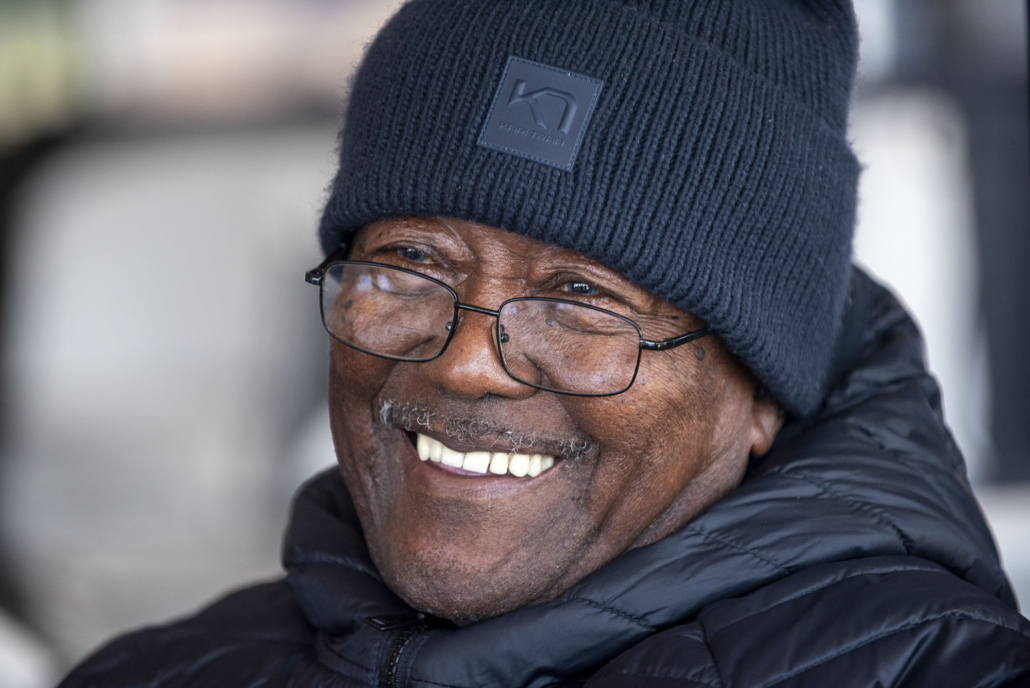
John Coleman was sentenced to die in prison and is released after serving 34 years. He recently celebrated his 89th birthday. Photo by Bernard Troncale.
“I’m 86 years old and all alone. Please don’t let me die in prison. I’m not ready to die yet.”
John Coleman wrote those words to me in June of 2020. He was suffering with kidney disease and living in the infirmary at St. Clair Correctional Facility, once the state’s most violent and mismanaged prison and recently the subject of a federal class-action lawsuit. I visited St. Clair frequently and had toured the entire place nearly a decade ago. It was shameful that Alabama housed anyone in these third-world conditions, much less octogenarians.
“I’m proud to say that at 86 years old I can still bathe myself, still put my underwear and clothes on right, my socks and shoes all by myself,” Mr. Coleman wrote, as if to signal that he would not be much trouble if he was, somehow, released from prison.
For the last three years, Appleseed has been working to free incarcerated Alabamians from extreme sentences imposed decades ago under the state’s draconian Habitual Felony Offender Act (HFOA). Everyone comes to us with a sentence of life imprisonment without parole; they’re supposed to die in prison. Because none of their offenses involved physical injury to another person, we are sometimes able to persuade prosecutors and judges that these sentences are excessive, these men have been punished enough, and they are no longer a threat to anyone.
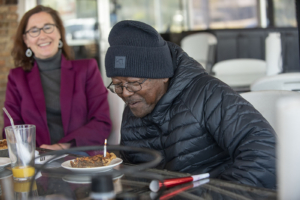
Mr. Coleman blows out his candle on his requested pecan pie for his 89th birthday.
Once our clients are freed, we cover them with supportive reentry services. Our small Appleseed team has embraced working closely with men in their 60s and 70s, newly freed and unsteady in our fast, modern world. We’ve gotten pretty good at this.
But the thought of finding – and funding – safe and stable re-entry housing and care for someone leaning toward 90 was daunting. With hundreds of incarcerated people asking for our services and two lawyers to tackle the stacks of desperate requests, I believed in 2020 that Mr. Coleman would have to wait until we were on surer footing with geriatric re-entry. I could not bear the thought of extracting him from St. Clair into an unknown future without robust medical care.
He turned 87, then 88. We got a grant to hire an experienced social worker who could navigate the byzantine world of federal social security and Medicaid forms. We secured release for another elderly client and got him safely situated in a nursing home within weeks.
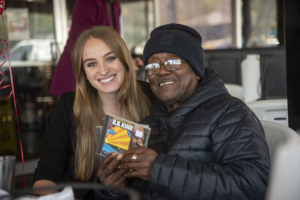
Mr. Coleman celebrates his 89th birthday with Legal Assistant Libby Rau and some new music!
So on June 12, 2022, a team from Appleseed arranged a legal visit with Mr. Coleman, during which he began to whistle. During the next visit, he began to sing.
And since then, he has joyfully confirmed what he first wrote to us nearly three years ago. He was not ready to die. And for that we are grateful. On March 14, Mr. Coleman celebrated his 89th birthday on the sunny porch of a Birmingham restaurant, surrounded by Appleseed staff and other recently freed clients, all older men ranging in age from 61 to 80.
I baked him a pecan pie, his requested dessert. Libby Rau, our legal assistant, swung by Seasick Records for some B.B. King and Al Green. Upon opening his gifts, once again Mr. Coleman began to sing.
After his birthday celebration, Mr. Coleman sat in my car nearly in tears. “Ms. Crowder, nobody has been nice to me like this in so long, I don’t know how to respond.”
The Legal Part
Once Appleseed agreed to take Mr. Coleman’s case, we began collecting legal documents and medical records. We knew he was serving life without parole for robbery and kidnapping as a result of one incident.
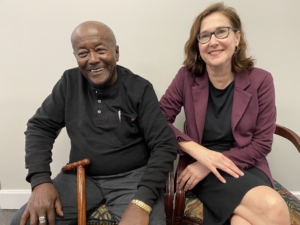
John Coleman with Executive Director Carla Crowder at the Appleseed offices on the day of his release.
A review of the trial transcript painted a fuller picture: In 1988, he attempted to rob a woman outside a Birmingham nightclub. An off-duty police officer was working security and immediately intervened when a woman came running towards him announcing that Mr. Coleman had a gun. Mr. Coleman backed away using the woman he had attempted to rob as a hostage. The off-duty officer called for back-up which quickly arrived. Mr. Coleman was cornered and ultimately dropped his weapon and was apprehended. The victim was freed without physical injury. When officers recovered Mr. Coleman’s weapon, they discovered it was not loaded. However, prior robbery convictions from the 1970s permitted an enhanced sentence under the HFOA, and Mr. Coleman was sentenced to life imprisonment without parole.
We determined the victims in this 34-year-old case had moved to California and long since passed away. There would be no victim opposition. Also promising was the fact that this case was in Jefferson County, where District Attorney Danny Carr was occasionally willing to not oppose our resentencing efforts, as long as the victims were not opposed.
But the question still loomed – how does a small, legal nonprofit ensure an 88-year-old man with little family support will have the medical care he needs? I did not need broken hips on my watch.
We acquired his 4-inch stack of medical records and Dr. Michael Smith, a Hoover physician who joined our Board of Directors last year graciously agreed to review them. Dr. Smith confirmed what we suspected, that Mr. Coleman had some mobility issues and once was provided a wheelchair. (It is unclear whether he agreed to actually use it.) There was some chronic age-related illness, but some hopeful news as well, he had once required dialysis for kidney disease but was off of dialysis. Onward!
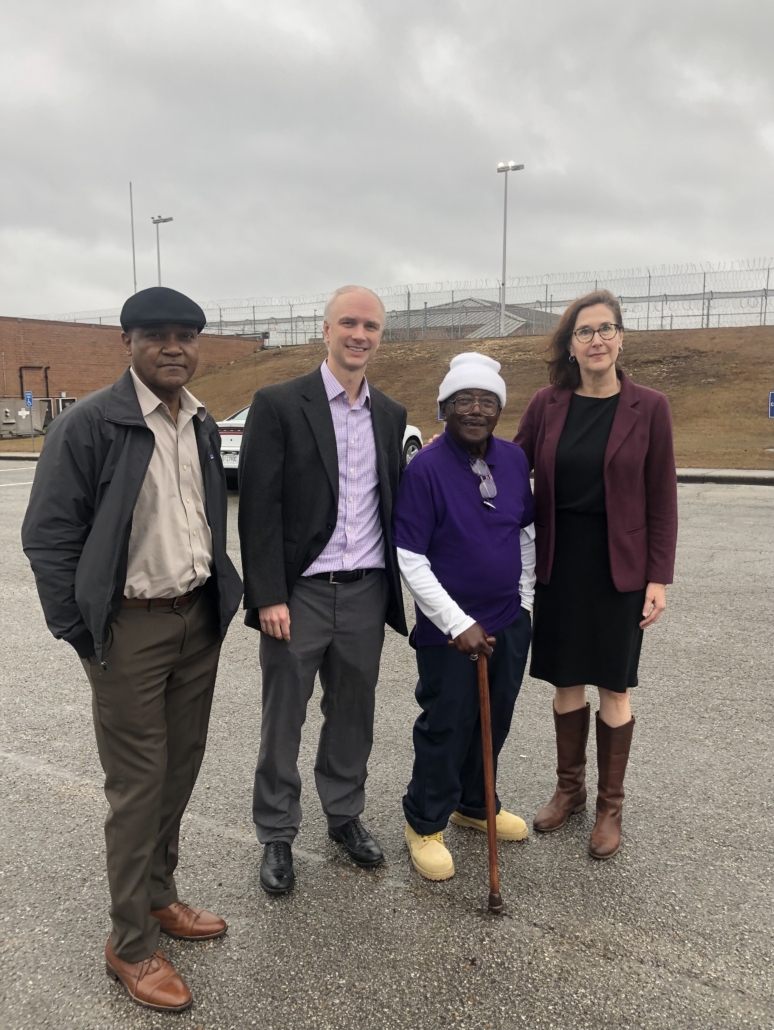
Appleseed Re-entry Coordinator Ronald McKeithen, Staff Attorney Scott Fuqua, and Executive Director Carla Crowder outside of St. Clair Correctional Facility with John Coleman on his release day.
Attorney Scott Fuqua set out to draft a post-conviction petition and began regular communication with Mr. Coleman. “Whenever he called to check in, he started referring to all of us collectively as ‘fam.’ He was so excited at the prospect of freedom, but was never in a rush. He was just happy to know someone cared and was working on his behalf,” Scott shared.
In January, DA Carr agreed not to oppose our release efforts, which meant Jefferson County Circuit Judge Kechia Davis would have jurisdiction to rule on a matter stemming from a 34-year-old conviction.
“Coleman has been incarcerated for 34 years under the Habitual Felony Offender Act (the “HFOA”) and has reached the extremely advanced age of 88-years old. He is serving a sentence of life imprisonment without parole. The incident which led to his incarceration did not result in any serious physical injury to the victim,” Carr wrote in his response. “As shown in Petitioner’s brief and supporting documents, Coleman has demonstrated clear evidence of rehabilitation, participated in extensive programming, and compiled an exemplary institutional record with only 1 disciplinary infraction in 34 years of incarceration.”
Judge Davis agreed and ordered Mr. Coleman’s resentencing to time-served. On February 9, he walked out of St. Clair prison with the assistance of a cane. It was a bleak, overcast day, but that did not matter to John Coleman.
Release Day
From the moment he walked into the parking lot with the fence and razor wire of St. Clair Correctional Facility behind him – in his past – John Coleman was smiling. A prison worker driving by as he walked out of prison wished him well. Mr. Coleman was well liked among prison staff, many of whom came to say goodbye before he left. Of all the Alabama prisons he’d been in, St. Clair prison was the most dangerous, Mr. Coleman told us.
“I’m glad y’all got a few of them out of there,” Coleman said. “I really thought I was never going to get out.”
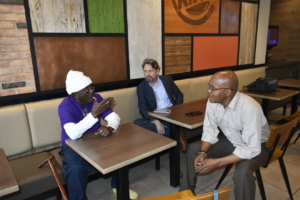
Mr. Coleman at Burger King for breakfast after his release with Appleseed Researcher Eddie Burkhalter and Re-entry Coordinator Ronald McKeithen.
We stopped at a nearby Burger King for biscuits and orange juice, but mostly for reassuring conversation that he would be taken care of as he gets back on his feet.
Lee Davis, who had served time in prison with Mr. Coleman in the 1980s and another man Appleseed successfully freed from a life without sentence, called Ron McKeithen on our staff during breakfast to say hello.
“Hey Hen! What’s going on?” Mr. Davis asked Mr. Coleman over the phone, calling him by his nickname, Hen. “Ain’t nothing happening. I’m just trying to get there,” Mr. Coleman told him.
“Everything is going to be good. I’m glad you’re on this side,” Mr. Davis said.
Attorney Scott Fuqua talked to him at breakfast about the next steps, and how he’d be able to live where he wanted, with support along the way from Appleseed. It was all a lot to take in, Coleman explained.
“I’m so satisfied right here I don’t know what to tell y’all,” Coleman said of sitting in a restaurant and eating a meal outside of prison fences for the first time in 34 years.
Asked what he was looking forward to most in the first days of his freedom, Mr. Coleman returned to talking about the men he’d served time with and whom Appleseed won freedom for.
“I just want to meet all the guys,” he said, and asked who’d be next to be freed.
Finally free and almost 90
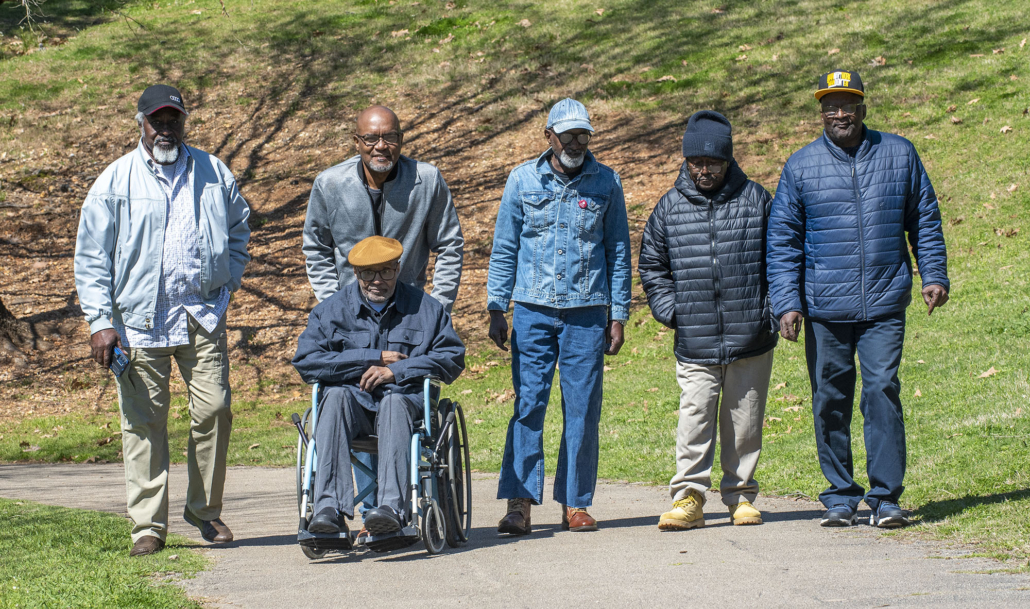
Mr. Coleman with Appleseed clients Larry Garrett, Ronald McKeithen, Robert Cheeks, Lee Davis, and Willie Ingram. Photo by Bernard Troncale.
Not surprisingly, Mr. Coleman has brought almost as much joy to us as we have given him. The only thing he’s ever asked for, aside from some snacks, was a battery for his dad’s old watch that he treasures. He loves orange juice and salad, as long as thousand island dressing is available. He’s determined to walk without a cane; we’re not sure exactly where he’s hidden it.
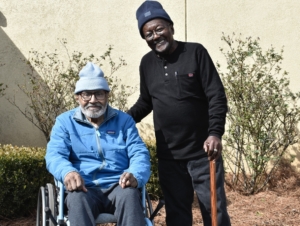
Mr. Coleman with Appleseed client Robert Cheeks.
Mr. Coleman resides at Shepherd’s Fold Reentry Ministry, joining three other older men who have been freed from death-in-prison sentences over the last few months. They all look out for each other.
Nearly every day, Appleseed’s Reentry Case Manager, Kathleen Henderson, checks in on him. She has helped him acquire critical identification and medical care. Her calm, reassuring presence has convinced Mr. Coleman that people in this world care about him. She’s begun the search for senior housing.
At his first medical appointment at Christ Health, the doctor noticed he and Mr. Coleman shared a birthday. The doctor left the room, then returned with a giant cookie and other staff singing “Happy Birthday.” Mr. Coleman told the doctor he didn’t know how to respond; he’s not used to anyone doing anything for him. “I ain’t never had anyone before ‘cept Appleseed.”
Appleseed Staff Attorney Scott Fuqua, Researcher Eddie Burkhalter, and Reentry Case Manager Kathleen Henderson contributed to this post.

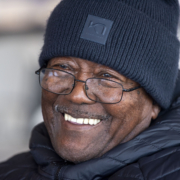




Leave a Reply
Want to join the discussion?Feel free to contribute!